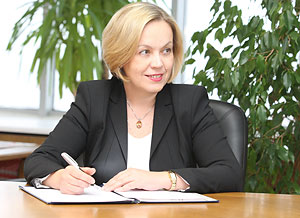
Geostrategic Interest and Democracy Promotion: The Contrasting Cases of Belarus and Ukraine
Publication: Eurasia Daily Monitor Volume: 10 Issue: 175
By:

A seemingly perpetual tension between Western universalism on human rights and down-to-earth geopolitics has no single resolution. With regard to Belarus, human rights remain preeminent albeit with the exception of the 2007–2010 period, during which a rapprochement between Brussels and Minsk was underway. But in the case of Ukraine, geopolitics trumps democracy promotion. Ukraine, it appears, is “too large an asset for the [European Union] to lose” (https://www.euractiv.com/europes-east/european-union-afford-lose-ukrai-analysis-508009), which Eurocrats do not even bother to conceal. Whereas Belarus is small and may be thought of by some as already lost.
Foreign policy, however, exists not only in the perception of policymakers but first and foremost in the perception of the people residing in target countries—an idea to which some strategists in Brussels and Washington seem to be immune. Consequently Brussels’s double standards are well-understood in Minsk, and the latter does not find it expedient to make even minor concessions to Europe. A recent visit to Minsk by Gunnar Wiegand, a high-ranking representative of the EU’s European External Action Service, reflected this situation. Following his visit, Yelena Kupchyna, Belarus’s deputy minister of foreign affairs, said that “[Belarus does not] participate in the European Dialogue on Modernization because it was launched without consultations with the Belarusian government” (https://naviny.by/rubrics/eu/2013/09/30/ic_articles_627_183169/). The Dialogue on Modernization is one of the EU’s trademark initiatives on Belarus with a primacy of talk over action. But even talk has failed as the Belarusian opposition, the only collective participant of a “dialogue” from the Belarusian side, did not come up with a single message and only showcased internecine battles and competition for Europe’s attention.
It is all the more illuminating that the aforementioned tension between Western geopolitics and democracy promotion is being publicly discussed by the opposition-minded analysts in Minsk, a community that takes its cues from the West, which it criticizes extremely rarely. The case in point is an article by Alexei Turovsky in Nashe Mnenie, an online publication with a URL country code reflecting its funding source (nmnby.eu/news/analytics/5280.html?).
Turovsky attaches importance to the observation that unlike the populations of Poland and the Baltic States, Ukrainians are split on their country’s geopolitical orientation—parity exists between those leaning toward the EU and those leaning toward Russia. “What will the west-central electorate in Ukraine gain from the association agreement with the EU?” Turovsky asks. “Money? But nothing seems to be assigned in the EU budget. IMF loans? But this institution never gave billions of dollars for social programs… Investment? But who will invest in a country where even such transnational monsters as [the steel manufacturer] AcelorMital sustain raider attacks [by the Ukrainian government]?” (nmnby.eu/news/analytics/5280.html?).
Turovsky admits that not all Ukrainians expect manna from the EU. For some of them, Euro-integration is a value-laden option to which one cannot affix a price tag. “But is Europe ready to bring to Ukraine democracy, human rights and honest elections?” Turovsky speculates. “Rather to the contrary! With its double and triple standards, Europe itself is ready to sacrifice its own values on the altar of its great goal [not to lose Ukraine]. From [President Viktor] Yanukovich Brussels no longer demands an end to repressions; it does not insist on the release of political prisoners and does not appeal to [Ukraine to] retain the freedom of expression. The utmost of Brussels’s demands is to effectively deport Yulia Timoshenko, muzzled and tormented as she already is, to Germany. Even so, dozens of Brussels-based nightingales are ready to sacrifice even this. A legion of Komorowski’s, Fule’s, Landsbergis’s, and Kowal’s [referring to Polish President Bronislaw Komorowski, EU Enlargement Commissioner Stefan Fule, European parliamentarian and former Lithuanian head of state Vytautas Landsbergis, and Polish EU parliamentarian Pawel Kowal] ask Europe to love Yanukovich the way he is… They trust that Ukraine’s path to Europe may go through dictatorship, hypocrisy, lies, coercion, bullying of political prisoners, falsifications of elections, and raider attacks on businesses. But will this combination suffice to mobilize the west-central electorate at the next presidential elections? If not, one can guarantee that the Kremlin’s henchman will win those elections. And then the entire grandiose geopolitical experiment of Brussels will burst like a soap bubble. This outcome will be sad not only for Ukraine but for all post-Soviet states,” concludes Turovsky.
In contrast to Ukraine, no soul-searching is currently underway by either of Belarus’s geopolitical neighbors. The West is just keeping up appearances, and Wiegand’s visit has been supremely reflective of that. Unlike the West or, in fact, the former Soviet Union, present-day Russia scarcely places its crude geopolitical message under an ideological veil of any sort—which is one reason why Russia is more often accused of arm-twisting than of hypocrisy. This time, however, Russia is treading softly, trying its best to minimize the effect of even the least palatable demarches of Belarusian President Alyaksandr Lukashenka.
Thus, contrary to multiple predictions, Vladislav Baumgaertner, the CEO of Russia’s potassium giant Uralkalii, jailed in Minsk, has not been released on the eve of or during Vladimir Putin’s September 28 visit in conjunction with the joint Russian-Belarusian military exercises, Zapad 2013. To be sure, in anticipation of his trial, Baumgaertner was transferred from a prison cell to a two-bedroom apartment where he remains under house arrest and under the supervision of four Belarusian KGB guards. Lukashenka claims that this was done after Baumgaertner’s mother appealed to the Belarusian president in writing (https://www.belta.by/ru/all_news/president/Lukashenko-za-smjagchenie-mery-presechenija-Baumgertner-mozhet-blagodarit-tolko-sobstvennuju-mat_i_647581.html). Indeed, Baumgaertner’s parents arrived in Minsk and are currently staying in the same apartment. Igor Karyagin, who chairs the consular department of the Russian embassy, even assured the media that Baumgaertner “is not complaining. He can exercise, and his mother cooks for him, while his attorney buys food according to a list compiled by the prisoner” (https://news.tut.by/politics/368329.html). Some participants of Radio Liberty’s talk show that discussed this peculiar situation claim that Lukashenka made a calculated risk, which may pay off if and when the Belarusian-Russian potassium cartel is resumed after the new ownership of Russian Uralkalii is finalized (https://www.svaboda.org/content/article/25122403.html).
Whether or not this is President Lukashenka’s cherished goal, the interim verdict of history is that he has not yet lost a single battle on either of Belarus’s geopolitical flanks. And this is despite ostracism and the fact that Lukashenka’s Belarus is arguably the world leader on the sheer number of predictions of its imminent economic collapse.




